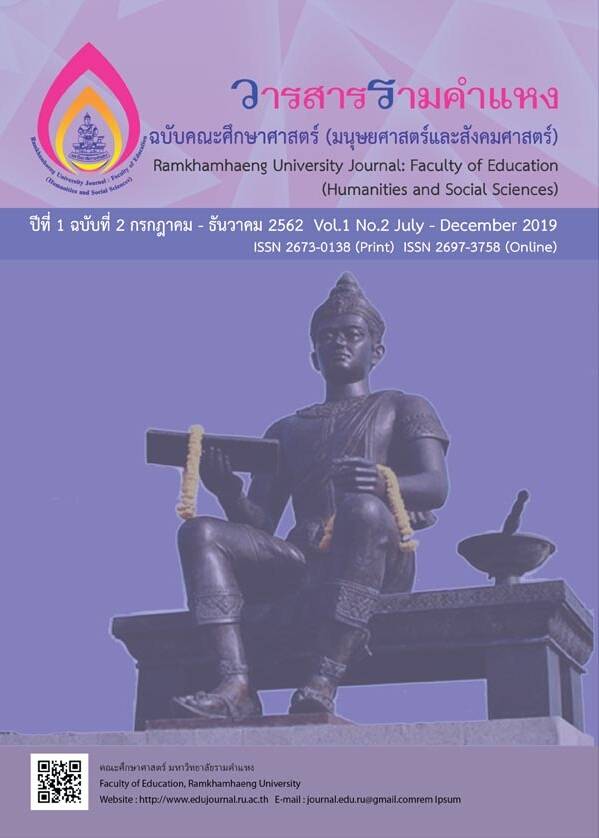Organizational Management Based on Buddhism by the Principle of Sappurisa-Dhumma
Main Article Content
Abstract
One of keys to the successful organizational administration is the collaboration between material and human resources to achieve the specified objectives. Organizational administration or management requires a science in administration as today's world is capitalism-or consumerism- oriented that seeks profit and competitive advantage in terms of administration and organizational development. In this regard, the principles of modern organizational administration have been adopted as a management strategy. Similarly, the Buddhist principles are integrated and applied to the management principles. Therefore, studying Buddhism leads to the knowledge that the science of sustainable management and the maintenance of humanity to live in peace is Buddhist administration under the application of organizational administration according to Seven Principles of Sappurisa-Dhamma, consisting of (1) the knowing of causes underlying all the happenings, (2) the knowing of the results or fruition derived from the causes, (3) the knowing of one's own self or self-knowledge, (4) the knowing of moderation or the sense of proportion, (5) the knowing of time or time management, (6) the knowing of the populated communities or societies or even the assembly, and (7) the knowing of an individual, or in other words, the individual differences. These principles can be integrated to organizational administration well. The primary aim of Buddhism is to develop human potential to be the person with physical and mental perfectness in order to live a happy and prosperous life and achieve the set goals. The Principles of Buddhism Science Administration have been applied by administrators to be integrated to the organizational management as a new approach or a new way towards the dimension of sustainable management, stability, and fairness for people or societies related to the organization wisely. This includes creating efficiency and effectiveness for sustainable and stable management. These principles shall be systematically applied in organizational administration along with the consideration of morale under the compliance with teachings of the Lord Buddha in the aspect of management and operation for maximum benefits.
Downloads
Article Details

This work is licensed under a Creative Commons Attribution-NonCommercial-NoDerivatives 4.0 International License.
ผู้ส่งบทความ (และคณะผู้วิจัยทุกคน) ตระหนักและปฎิบัติตามจริยธรรมการวิจัยอย่างเคร่งครัด ทั้งนี้บทความ เนื้อหา ข้อมูล ข้อความ ภาพ ตาราง แผนภาพ แผนผัง หรือข้อคิดเห็นใดๆ ที่ปรากฎในบทความ เป็นความคิดเห็นและความรับผิดชอบของผู้ส่งบทความ กองบรรณาธิการไม่จำเป็นต้องเห็นตามเสมอไป และไม่มีส่วนรับผิดชอบใดๆ โดยถือเป็นความรับผิดของของเจ้าของบทความเพียงผู้เดียว
References
ปาริชาติ เยพิทักษ์ และธีระวัฒน์ จันทึก. (2559). การบริหารจัดการข้อมูลขององค์กรในภาครัฐ, Veridian E-Journal, Silpakorn University (ฉบับภาษาไทย สาขามนุษยศาสตร์ สังคมศาสตร์ และศิลปะ), (1), 16-26.
พระมหามงคล สารินทร์, อภิธีร์ ทรงบัณฑิต และสมชาย เทพแสง. (2556). การบริหารงานตามแนวพุทธธรรม.วารสารบริหารการศึกษา มศว., 1419), 84-88.
วรภาส ประสมสุข และนิพนธ์ กินาวงศ์. (2549). หลักการบริหารการศึกษาตามแนวพุทธธรรม, วารสารศึกษาศาสตร์, 18(2), 63-83.
Chaisamon Tontan. (2555). Personnel management. From https://www.gotoknow.org/posts
National Office of Buddhism. (2545). The modern management principle and management principles of Buddhism For the stability of Buddhism. From http://www.onab.go.th/articles
Phramahasomchai Thanwuttho. (2553). Sappurisadhumma: Impartial people as satburut. From https://www.dmc.tv/pages/top_of_week/20100830-DMC-A08.html
Rajamangala University of Technology Campus Khon Kaen. (2553). The meaning and significance of the administration. From https://sites.google.com/site/poppypresent1
Sompob Moonme. (2557). Balanced Scorecard. From https://www.gotoknow.org/posts/321453
Tawin Arunwat. (2560). Administration according to Sappurisadhumma7. From http://thawin09.blogspot.com/2017/02/blog-post_12.html
Wilawan Rapeepisat. (2554). Basic knowledge in human resources management. Bangkok: Printing the splendid craft organizations.


